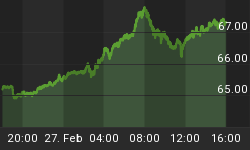Wednesday was another day without any scheduled economic releases of note; it was not, though, a day which needed it since there were some interesting news items that led to market action today and/or may produce market action tomorrow.
The most interesting news, and the most interesting market response, was to the leaked news that PIMCO's Total Return fund (a mere bauble in the treasure chest of Bill Gross, at a hardly-worth-discussing $237bln of assets under management) has completely divested itself of all government-related securities including Treasuries as well as agencies. If true, this is remarkable not because of direction (it isn't clear to me why anyone would hold 10-year Treasuries at 3.50% when they can hold 10y TIPS at 1%. I am not saying that a 1% real yield is great but compared to 3.50% nominal you're unlikely to sharply underperform and might fairly dramatically outperform) but because of the extremity of the position. The fund doesn't have a low weight, like 10% or 5% or even 1%. It has precisely a zero weight assuming the stories are true. That's a strong call.
The interesting market response is that bonds rallied with the 10y yield down 8bps to 3.475%. Some of this was due to a good Treasury auction but I think most of it is related to the idea that with PIMCO no longer selling, but the Fed still buying, the supply and demand balance just tilted in favor of nominal rates declining. It was always somewhat surprising to see bond yields rising when the Fed was buying huge amounts of Treasuries. One of the explanations that made sense was that some holders of Treasuries could use the liquidity provided by the bottomless bid to lighten their own positions without the market effects that would usually be associated with selling tens of billions of bonds. I would have guessed the Chinese or other central banks as the likely sellers, but Gross is essentially running another sovereign wealth fund so this fits.
I don't think the rally is a lasting thing, however, at least on this basis. The Fed will stop buying in a few months, and well before then the markets will need to shift from expecting a balance in the actions of the Treasury (seller) and the Fed (buyer) to expecting a much more-lopsided supply equation (and potentially, if monetary policymakers are serious about their hawkish words, additional supply from the central bank itself). But for a day, the Bond King caused a rally by not doing something.
The other interesting news item occurred late and so isn't reflected in the closing quotes that had Crude oil down 1%. The news came late today that a pipeline connecting Iraq and Turkey, which carries about a quarter of Iraq's exports, was shut down when it was damaged by a bomb attack. Exports will fall by around 590,000 barrels/day during the shutdown.
The shutdown is only expected to last a few days, but it highlights an important point about the importance of the revolution in Libya and the loss of those exports. That loss doesn't only mean that the absolute level of oil supplies will be lower (although our oil right now is being supplied by ships that were already on the water so the cessation in Libyan exports hasn't directly affected supplies yet), but also that oil supplies are more sensitive to disruption.
This is actually not unusual. There is quite a bit of research that supports the notion that the volatility of a commodity's price is positively related to the level of the price (see Deaton & Laroque 1989, Fama & French 1987, Geman & Nguyen 2002). The mechanism is just this: inventories provide a buffer against supply disruptions, so when inventories are low and the available supply is essentially fixed, a small shift in demand operates on a near-vertical part of the supply curve, producing amplified effects. Of course, lower inventories are also associated with higher prices; ergo, higher prices and higher volatility tend to occur together.
Accordingly, watch oil prices tomorrow. A large increase (especially in Brent) will suggest that market participants are not completely sanguine about whether the Saudis or strategic reserves can provide a sufficient buffer against supply disruptions.
Initial Claims (Consensus: 376k) provides us the first real data of the week. Last week's 368k print was the lowest in several years, and with the week-to-week volatility finally ebbing the real question is whether Claims have shifted to a lower equilibrium (and if so, where?) or are in the process of trending lower. I suspect this is a real downtrend, but a slow one.
Also due out are the Trade Balance for January (Consensus: -$41.5bln vs -40.6bln previous) and the February budget statement (Consensus: -$225.2bln vs -220.9bln). Yes, folks, those are monthly deficits at a level we once thought was a particularly bad year for the budget. And it's happening during an expansion!















